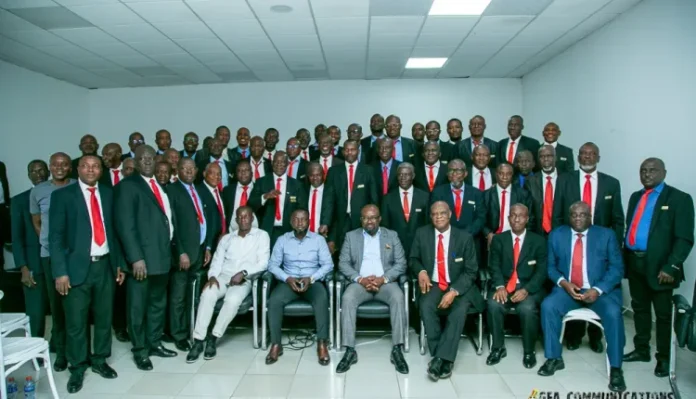In Ghana’s football commentary circles, referees are under a constant microscope. Pundits dissect their decisions, fans debate their calls, and the Ghana Football Association (GFA) often has to respond to waves of criticism about officiating standards. But amid all the noise, one crucial group remains largely invisible, and worryingly silent:
Match Commissioners.
These are the officials who, by regulation, are responsible for ensuring order, safety, and protocol compliance before the first whistle blows. Yet, when matches spiral into chaos, or security collapses, no one asks the obvious: Where was the Match Commissioner?
The Match Commissioner: A Role Beyond the Clipboard

According to the GFA’s own General Regulations, a Match Commissioner is not just a passive observer. Their job begins before the players line up. They are tasked with:
- • Leading pre-match coordination meetings.
- • Ensuring all security and organizational arrangements are in place.
- • Checking accreditation and access control for designated zones.
- • Monitoring the referee’s preparation and environmental conditions.
- • Submitting an official match report immediately after the game.
Crucially, the Match Commissioner has the power to delay the start of a match if safety conditions are not met.
Yet in Ghanaian football today, many of these duties are either ignored, rushed through, or treated as formalities. And when problems erupt, it’s always the referee who ends up in the firing line—never the commissioner who allowed the game to start in a compromised environment.
A Benchmark of Professionalism: Ashford Tetteh Oku’s Example

For context, let’s revisit the 2014/15 season, when Ashford Tetteh Oku won Match Commissioner of the Year. He earned that title not for turning a blind eye to the rules, but for standing by them, no matter who was involved.
In one now-famous incident, Oku reportedly denied entry to then-GFA President Kwesi Nyantakyi into the secure area of a stadium because he was not properly accredited. Let that sink in: the most powerful man in Ghanaian football was turned away because the Match Commissioner respected the protocols more than personalities.
Today, how many match commissioners would have the courage or professionalism to do the same?
The Decline: From Watchdogs to Sleeping Dogs
Unfortunately, many of today’s Match Commissioners have become what some insiders cynically call “sleeping dogs.” Present in name, absent in action.
Matches begin with questionable crowd control, poor perimeter security, and unauthorized individuals roaming restricted zones, yet games proceed without a hitch.
When post-match incidents occur, pitch invasions, fan assaults, and referee harassment, very few ask how those threats were allowed to develop in the first place. The Match Commissioner, who should have flagged and addressed these dangers before kickoff, is nowhere in the conversation.
Instead, attention is diverted to the referee’s penalty decision or a questionable offside call.
The Consequences Are Too High
This isn’t just a bureaucratic lapse. The consequences of the Match Commissioners’ neglecting their duties are real:
- • Fan safety is compromised, as seen in past tragedies.
- • Players and referees are endangered due to lax perimeter control.
- • GFA’s image suffers, as basic organisational standards are flouted.
- • Public trust erodes, as fans wonder if there’s any accountability beyond the referee’s whistle.
The silent failure of Match Commissioners enables these outcomes, and yet, their role remains unexamined in the media, even by analysts who should know better.
What Needs to Happen Now

If Ghanaian football is serious about raising standards, the role of the Match Commissioner must be restored to its rightful importance.
Here’s how:
1. Media Spotlight
Talk shows, analysis segments, and GFA briefings must start mentioning commissioners when things go wrong or right.
2. Training and Empowerment
Commissioners need continuous training and full institutional backing to assert themselves on match day, even against club officials or powerful personalities.
3. Strict Protocol Enforcement
No accreditation? No entry. No exceptions. Let’s return to that Ashford Tetteh Oku standard.
4. Audits and Accountability
Post-match commissioner reports should be subject to audit and review. Penalties must apply for negligence.
5. Public Recognition
Just as we award Best Referee of the Season, let’s also recognise and reward Match Commissioners who uphold integrity and discipline in our game.
Don’t Just Blow the Whistle, Check Who Started the Game
Referees will always be in the spotlight. But it’s time football fans, media, and administrators widen their lens. Before any controversial decision on the pitch, there’s a commissioner who allows the match to begin.
Let’s not keep pointing fingers only at the whistle-blowers. Let’s also hold accountable those who stood at the gates and let chaos walk in.



